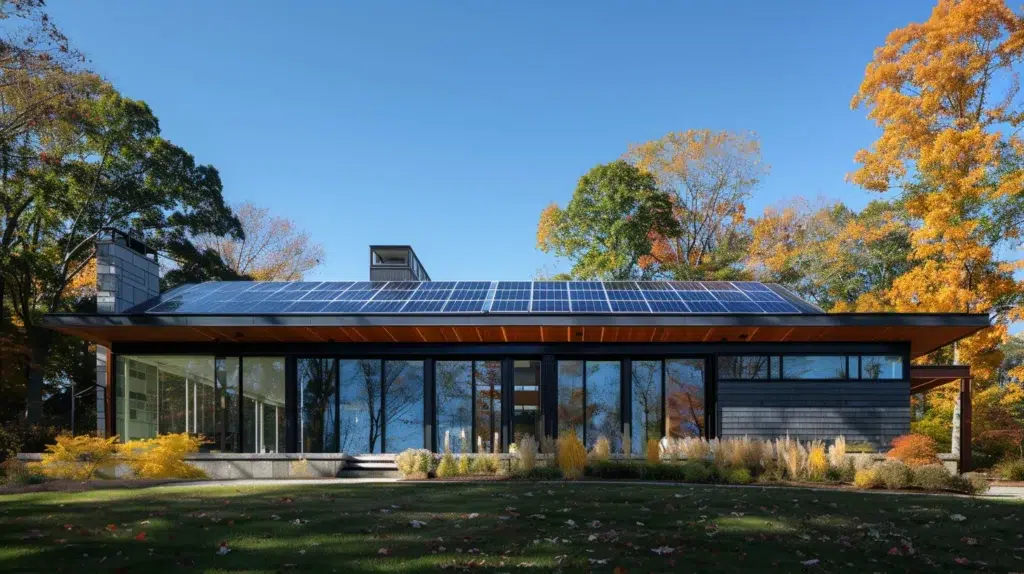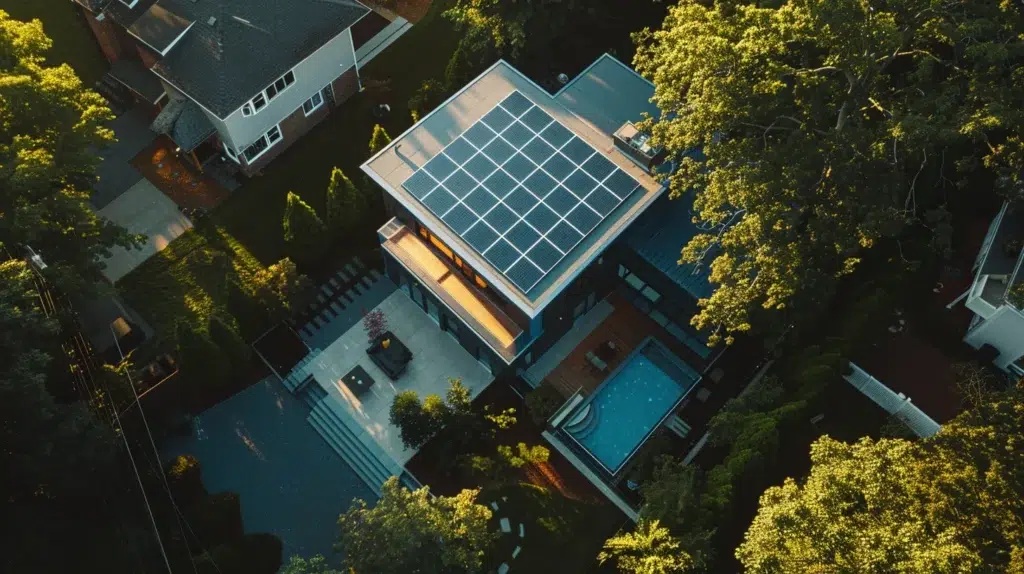
An in-Depth Look at Massachusetts Solar Installation Costs
Massachusetts Solar Installation Costs Explained
Is the cost of solar installation in Massachusetts holding you back from making the switch to renewable energy? Understanding the various factors that influence solar installation costs is essential for homeowners navigating this decision. This article will outline average costs, available incentives and rebates, and financing options to help you assess the financial implications. By engaging with this content, homeowners will gain insight into maximizing their savings and making an informed choice about solar energy. This guide aims to empower you to take control of your energy costs confidently, all while contributing to a greener future.
Key Takeaways
- Evaluating energy needs is crucial for determining the appropriate solar system size
- Federal and state incentives can significantly lower solar installation expenses for homeowners
- Understanding financing options provides flexibility for managing upfront solar installation costs
- Assessing installation complexity helps anticipate total costs and potential adjustments needed
- Solar installations can increase property value, often yielding higher sale prices compared to non-solar homes
Understand the Various Factors Influencing Solar Installation Costs in Massachusetts

When considering solar installation costs in Massachusetts, multiple factors come into play. Evaluating the size of the solar energy system directly impacts expenses, while the type of solar panels affects both efficiency and pricing. Assessing installation complexity and accounting for additional equipment and permitting costs is equally essential. Understanding these components helps homeowners appreciate how renewable energy investments contribute to reducing carbon footprints and addressing climate concerns.
Evaluate the Size of Your Solar Energy System
Evaluating the size of a solar energy system is crucial for determining installation costs in Massachusetts. Homeowners must consider their energy consumption patterns to determine the appropriate system capacity that meets their needs, which directly influences expenses related to solar power. Additionally, the choice of solar inverter can impact performance and overall costs, making it essential for customers to understand how different sizes and equipment work together to optimize energy generation while ensuring valid warranty protections.
Consider the Type of Solar Panels Used
Choosing the right type of solar panels is a significant factor that influences installation costs in Massachusetts. Higher-efficiency panels may offer better energy production, which can result in lower reliance on fossil fuel sources, ultimately leading to reduced energy bills. Homeowners should also evaluate their property’s unique energy needs and how different panels can complement those needs, contributing to a more sustainable energy ownership experience.
Assess Installation Complexity
Assessing the complexity of solar installation directly impacts costs in Massachusetts. Factors such as roof type, elevation, and existing electrical infrastructure can influence installation ease and subsequently affect pricing. Homeowners should be aware of financing options, like cash payments, power purchase agreements, and PACE financing, as these can provide flexibility in managing upfront costs while navigating complex installations.
| Installation Complexity Factors | Impact on Costs | Financing Options |
|---|---|---|
| Roof Type (flat, sloped, etc.) | Affects labor and equipment needs | Cash, Power Purchase Agreement, PACE Financing |
| Elevation and Accessibility | Higher costs for difficult-to-reach areas | Flexible financing options to minimize upfront costs |
| Existing Electrical Infrastructure | Modifications may increase overall expenditure | Planning for future energy efficiency can enhance system value |
Factor in Additional Equipment and Permitting Costs
Homeowners in Massachusetts should consider additional equipment and permitting costs when evaluating solar installation expenses. These costs can include energy storage systems, which allow for better management of power and can lower average energy bills, contributing to reduced greenhouse gas emissions. Permitting fees vary by location, so understanding the specific requirements of one’s zip code is essential to accurately estimate total installation costs, especially when exploring lease options for financing.
- Consider the necessity of energy storage to enhance efficiency and savings.
- Evaluate permitting fees that may differ based on your local zip code.
- Explore lease options that can ease upfront costs associated with additional equipment.
Knowing the factors that shape solar installation costs sets the stage for understanding what homeowners can expect. Now, let’s look at the average solar installation costs in Massachusetts, where numbers tell a clearer story.
Explore Average Solar Installation Costs in Massachusetts

Understanding solar installation costs in Massachusetts involves comparing costs based on system size, analyzing price variations across different regions, and examining current market trends and projections. Homeowners can benefit from insights into how system size, including solar water heating and wind power options, influences overall expenses. Furthermore, awareness of charging station installations and regional pricing variations can help residents make informed decisions about solar investments.
This analysis not only emphasizes the significance of system capacity but also looks at how insurance impacts overall costs, ensuring that homeowners are equipped with essential knowledge for optimizing their energy solutions.
Compare Costs Based on System Size
When comparing solar installation costs in Massachusetts based on system size, it’s essential to factor in the homeowner’s energy consumption. Typically, larger systems, designed to accommodate higher energy needs, require a larger investment upfront but often yield a more favorable return on investment over time. For those going solar in massachusetts, evaluating the initial contract terms can provide critical insights into expected savings and long-term benefits associated with various system sizes.
- Understand the relationship between system size and energy consumption.
- Assess the upfront costs versus long-term savings for larger systems.
- Review contract terms to ensure favorable financing and ROI expectations.
Analyze Price Variations Across Different Regions
Price variations for solar installations in Massachusetts can be significant depending on the region, influenced by factors such as local rebates, tax credits, and property tax incentives. For instance, cities that actively support renewable energy initiatives may offer more generous financial assistance, making solar systems more affordable. Moreover, understanding net metering policies in different areas can help homeowners maximize savings by allowing them to receive credits for excess energy produced, ultimately impacting the overall price of solar energy adoption.
Look at Current Market Trends and Projections
Current market trends indicate a steady decrease in solar installation costs across Massachusetts, driven in part by advancements in technology and increased competition among providers. Resources like EnergySage offer valuable insights for homeowners, helping them compare prices and evaluate potential savings based on their energy needs. As utility companies adapt to these changes, new incentives are emerging, making solar energy more accessible and cost-effective, especially for those considering electric vehicles and aiming to reduce overall energy expenditures.
Understanding the costs of solar installation is just the beginning. Next, dive into how incentives and rebates can change the financial picture for homeowners in Massachusetts.
Assess the Value of Solar Incentives and Rebates in Massachusetts

Federal tax credits significantly enhance the affordability of Massachusetts solar panels, providing financial relief for homeowners pursuing energy independence. State-specific rebates and programs, including community solar initiatives, further contribute to reduced installation costs. Understanding these incentives and their impact on overall expenses is essential for homeowners in Rhode Island and Massachusetts analyzing their financial commitments, especially when considering options like water heating systems.
Review Federal Tax Credits for Solar Installation
Federal tax credits play a significant role in enhancing the affordability of solar installations in Massachusetts, allowing homeowners to reduce their overall fee significantly. By claiming up to 26% of the installation costs, including systems powered by trusted brands like REC, homeowners can improve their return on investment while contributing to energy development. This financial incentive minimizes the impact of potential interest rate increases, ensuring that residents have a robust support system for moving towards renewable energy solutions.
Investigate State-Specific Rebates and Programs
Massachusetts offers a variety of state-specific rebates and programs that can significantly reduce solar installation costs for homeowners. For example, incentives are available for energy-efficient upgrades such as heat pumps, which can work alongside solar power systems to enhance overall efficiency. Additionally, programs aimed at supporting electric car charging stations encourage residents to consider clean energy solutions for both transportation and home heating, allowing for a more comprehensive approach to energy savings.
- State rebates help lower installation costs for solar energy systems.
- Incentives for heat pumps enhance energy efficiency when paired with solar solutions.
- Programs supporting electric car charging promote sustainable energy use.
Understand How Incentives Affect Overall Costs
Incentives significantly influence solar installation costs, making renewable energy solutions more accessible for homeowners. For instance, the federal tax incentive allows residents to claim a percentage of their installation expenses, providing substantial financial relief that can help offset the overall investment. Additionally, local programs in Boston focus on energy conservation, aiming to reduce upfront costs while encouraging sustainable practices, which align with the energy information administration’s goals of minimizing reliance on fossil fuels and promoting cleaner energy alternatives.
Solar incentives and rebates can lighten the financial burden of installation. As savings from these programs accumulate, it becomes vital to consider how to finance the transition to solar energy effectively.
Learn About Financing Options for Solar Installation

Homeowners in Massachusetts should explore various financing options for solar installation to optimize costs and savings. This section discusses solar loans and leases, offering flexibility for upfront payments. It also covers Power Purchase Agreements, which allow energy purchase at a set rate. Finally, a comparison of traditional financing methods will help evaluate interest rates and credit impacts in the current climate of inflation and energy security.
Explore Solar Loans and Leases
Solar loans and leases present homeowners with flexible financing options while navigating solar installation costs in Massachusetts. With solar loans, individuals can finance the upfront costs of their solar energy systems, allowing them to pay over time while benefiting from lowered energy bills and increased efficiency. Alternatively, solar leases offer a practical solution by allowing homeowners to install solar panels without the large initial payment, instead paying monthly for the energy generated—a model endorsed by the Solar Energy Industries Association for its accessibility and affordability, tailored to diverse energy consumption patterns.
Understand Power Purchase Agreements
Power Purchase Agreements (PPAs) offer an innovative financing solution for homeowners in Massachusetts looking to install solar energy systems without significant upfront costs. Under a PPA, homeowners agree to purchase electricity generated by the solar panel installation at a predetermined rate, allowing for immediate savings on energy bills while avoiding large initial payments. This arrangement enables residents to make the transition to renewable energy more accessible, while also providing price stability amidst fluctuating energy costs.
| Features of Power Purchase Agreements | Benefits for Homeowners |
|---|---|
| No Upfront Costs | Allows immediate access to solar energy |
| Fixed Rate for Electricity | Provides stability against rising energy prices |
| Maintenance Included | Less hassle for homeowners, as providers typically handle maintenance |
Compare Traditional Financing Methods
When looking at traditional financing options for solar installations in Massachusetts, many homeowners often consider personal loans and home equity loans as viable methods. Personal loans can provide quick access to funds without putting a home at risk; however, they typically carry higher interest rates. On the other hand, home equity loans allow homeowners to leverage the value of their properties, usually offering lower rates and longer repayment terms, making them an attractive choice for those able to afford the upfront costs of solar energy systems while maximizing long-term savings.
Financing solar installation opens doors to new possibilities. As the system begins to take shape, the question of long-term savings emerges, waiting to be explored.
Analyze Long-Term Savings With Solar Installation

Homeowners in Massachusetts can expect substantial long-term savings with solar installation. Evaluating monthly energy bill reductions provides insight into the immediate financial benefits. Additionally, calculating the payback period for your investment helps determine how quickly solar can become a cost-effective choice. Lastly, exploring increases in property value over time highlights the lasting advantages of transitioning to renewable energy solutions.
Evaluate Monthly Energy Bill Reductions
Evaluating monthly energy bill reductions is a crucial aspect of assessing the long-term savings associated with solar installation in Massachusetts. Homeowners can expect significant decreases in their electricity expenses, particularly if their solar energy systems are tailored to meet their specific consumption needs. With the consistent rise in energy prices, utilizing solar power not only helps lock in more stable energy costs but also translates into ongoing savings, allowing homeowners to redirect funds toward other priorities or investments.
Calculate Payback Period for Your Investment
Calculating the payback period for a solar installation is essential for homeowners in Massachusetts considering the financial viability of their investment. This timeframe indicates how long it will take for energy savings to equal the initial cost of the solar system, allowing homeowners to assess their return on investment effectively. For instance, if a solar system costs $20,000 and saves $2,000 annually on energy bills, the payback period would be ten years, making it easier for homeowners to make decisions based on long-term financial benefits and stability.
Explore Increases in Property Value Over Time
Investing in solar installation can lead to increased property value for homeowners in Massachusetts. Studies show that homes equipped with solar energy systems often fetch higher sale prices, making them more attractive potential purchases in a competitive real estate market. For example, according to research, homes with solar panels can sell for an average of 4% more than similar homes without them, providing homeowners an additional incentive to consider solar energy as a financially sound investment in their property’s future.
| Impact of Solar Installation on Property Value | Average Increase in Sale Price |
|---|---|
| Homes with Solar Panels | 4% Higher than Comparable Homes |
Solar installation offers a path to steady savings over time. Next, let’s address common questions about the costs involved in Massachusetts.
Frequently Asked Questions About Solar Installation Costs in Massachusetts
Understanding the average cost to install solar panels is essential for homeowners considering solar energy in Massachusetts. Additionally, selecting the right installer can significantly impact the project’s success. Before embarking on this journey, it’s crucial to know what to expect to make informed decisions. Each of these topics provides valuable insights that will guide homeowners through the solar installation process.
What Is the Average Cost to Install Solar Panels?
The average cost to install solar panels in Massachusetts typically ranges between $15,000 and $30,000, depending on the system size and specific energy needs of the homeowner. This investment can result in substantial long-term savings on electricity bills, particularly as energy prices rise. Moreover, local incentives can further decrease these initial costs, making solar installations a more appealing option for homeowners in the region:
| Cost Factors | Typical Range | Potential Savings |
|---|---|---|
| Installation Size | $15,000 – $30,000 | Substantial savings on energy bills |
| State Incentives | Variable | Reduces initial investment |
| System Efficiency | Higher efficiency can impact overall costs | Enhanced energy output |
How Do I Choose the Right Installer for My Project?
Choosing the right installer for a solar energy project in Massachusetts involves evaluating several critical factors to ensure quality and reliability. Homeowners should look for contractors with relevant experience in solar installations, positive customer reviews, and a strong understanding of local regulations and incentives. Additionally, obtaining multiple quotes allows homeowners to compare pricing and services, ensuring they receive the best value while making informed decisions about their renewable energy investment.
What Should I Know Before Starting My Solar Journey?
Before embarking on a solar journey, homeowners in Massachusetts should thoroughly assess their energy needs and research potential installation options. Understanding the specific benefits of various solar panel technologies, as well as the local incentives that can significantly reduce setup costs, is crucial. Homeowners are encouraged to obtain multiple quotes from reputable installers to ensure they receive competitive pricing and to clarify any uncertainties regarding system efficiency, warranties, and maintenance requirements.
Conclusion
Understanding solar installation costs in Massachusetts is essential for homeowners looking to optimize their investment in renewable energy. Key factors like system size, panel type, and installation complexity directly influence expenses, ultimately impacting long-term savings and property value. Additionally, leveraging federal and state incentives can significantly reduce upfront costs and enhance financial benefits. By evaluating these components, homeowners can make informed decisions that not only meet their energy needs but also contribute to a more sustainable future.




